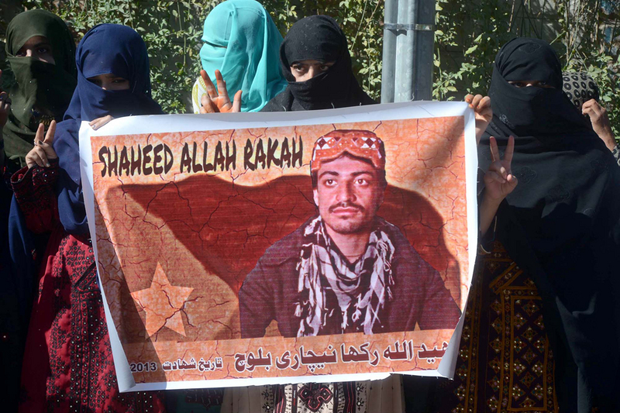Pakistan: Marchers aim to raise awareness of Baloch disappearances

Members of Baloch Shohada Committee lighten candles during a protest against Baloch genocide on the occasion of Youm-e-Shohada-e-Baloch. (ppiimages / Demotix)
Farzana Majeed holds Pakistani media as responsible for the disappearances of thousands of Baloch nationalists as the state security apparatus, labelling it a “very willing accomplice.”
29-year old Majeed is among the two dozen people on a long march organised by the Voice of Missing Baloch Persons (VOMBP) which has protesting for the last four years. They are demanding the return of their loved ones, who they allege have been illegally apprehended and detained by Pakistan’s intelligence and security agencies.
“The media should be the voice of the victims and report on the atrocities committed on our people; instead they are pressured into silence by the state”, she said.
The march began on October 27 from Quetta in Balochistan covering a distance of almost 700 km, and will reach Karachi, in the Sindh province, by the end of the week. There, outside the Karachi Press Club, they will hold an indefinite sit-in and hunger strike. The marchers started with covering anywhere between 35 to 40 km/day, but blisters and illness are slowing down progress to barely 25km a day.
The mineral-rich Balochistan is the largest of the four provinces of Pakistan, and was an independent state until 1947, when Pakistan annexed its eastern side and Iran its western side. For many Baloch families, since the disappearances began more than a decade back, life has not been the same.
According to Qadeer Baloch who founded the VOMBP, around 18,000 Baloch nationalists, including doctors, professors, politicians and students, have been abducted since 2001. “We have received mutilated corpses of 1,500 of them.”
Farzana Majeed’s brother Zakri was abducted four years ago from the city of Mastung. He was the vice president of the Baloch Students Organisation (Azad), a nationalist student group raising awareness of the rights of the Baloch on campuses. Despite holding a double master’s in biochemistry and Balochi language, Majeed said her life has been put on “on hold” and her three siblings and mother rendered “homeless” since Zakri’s disappearance. She hasn’t heard any news of him for three years.
Baloch’s own son Jalil Reiki, the information secretary of Baloch Republican Party, was picked up in 2009. Almost two years and eight months later, his tortured and bullet-riddled body was found.
“The disappearances started way back in 2001 during president Pervez Musharraf’s rule but this human rights abuse came on public radar in 2004-05 after the women — mothers, sisters and wives — started coming out and began protesting,” explained Malik Siraj Akbar, editor of online English newspaper The Baloch Hal. He said Baloch women hardly ever come out publicly and so when they did, they were bound to be noticed.
“Except for BBC, and a couple of English national dailies, no other media is supporting us,” said Baloch, who is leading the march. The lukewarm response, however, has failed to deter the marchers. “It is a way of teaching our coming generation the value of speaking up,” Baloch told Pakistan’s Dawn newspaper.
“Some of our friends in the media have disclosed that the intelligence agencies have warned and threatened them from covering our peaceful protest; others have been told that we are causing bad publicity internationally,” he added.
Akbar, who has taken asylum in the United States after most of his friends and colleagues were killed, said: “I know the agencies have been threatening the protesters with dire consequences and forcing them to shut down their camps and end the rally.” However, he added that he was not aware of any “threats or pressure on the media from the agencies and the government”.
But according to the chairperson of the independent Human Rights Commission of Pakistan, Zohra Yusuf, “journalists in Balochistan are under pressure from the Frontier Corps [federal reserve military force], the Baloch separatists as well as the religious extremists”.
Mazhar Abbas, a former secretary general of the Pakistan Federal Union of Journalists, speculated that the poor coverage of the march, as well as the issue of disappearances, may be due to the “influence used on media barons by the intelligence agencies”.
While he emphasised the electronic media had covered the Supreme Court hearings around the issue at length, he found it had never been tackled properly from a human rights angle. He lamented the “non-professional” attitude of the print media which did not find the issue grave enough to do investigative reporting on it.
The missing are no longer an “exciting” story so they are not covered by the national media, Akbar said. “Unfortunately, nobody seems to care much about it in a country where dozens of people are killed every day,” he said.
Zohra Yusuf also said the urban-based media did not seem particularly interested in the issue as it was more “ratings oriented”.
As for the on-going march not able to attract media’s attention, Abbas suggested that had it been led by “known political or nationalist figures”, it would have automatically lured the media to it.
A recent HRCP report, based on a fact-finding mission to Balochistan, stated that while the people of the province have pinned their hopes on the new government to address the problems, especially regarding the “grave human rights violations”, many do not see any visible policy change “within the security and intelligence agencies”, as the “kill-and-dump policy” continued.
According to Malik Siraj Akbar, while the ongoing long march isn’t any different from past demonstration, it is the “first major protest” since the new governments in the province and the centre took over the reins.
“The long march reflects the new government’s failure to resurface the missing persons and normalise the situation in Balochistan,” he pointed out.
This article was originally published on 20 Nov 2013 at indexoncensorship.org

